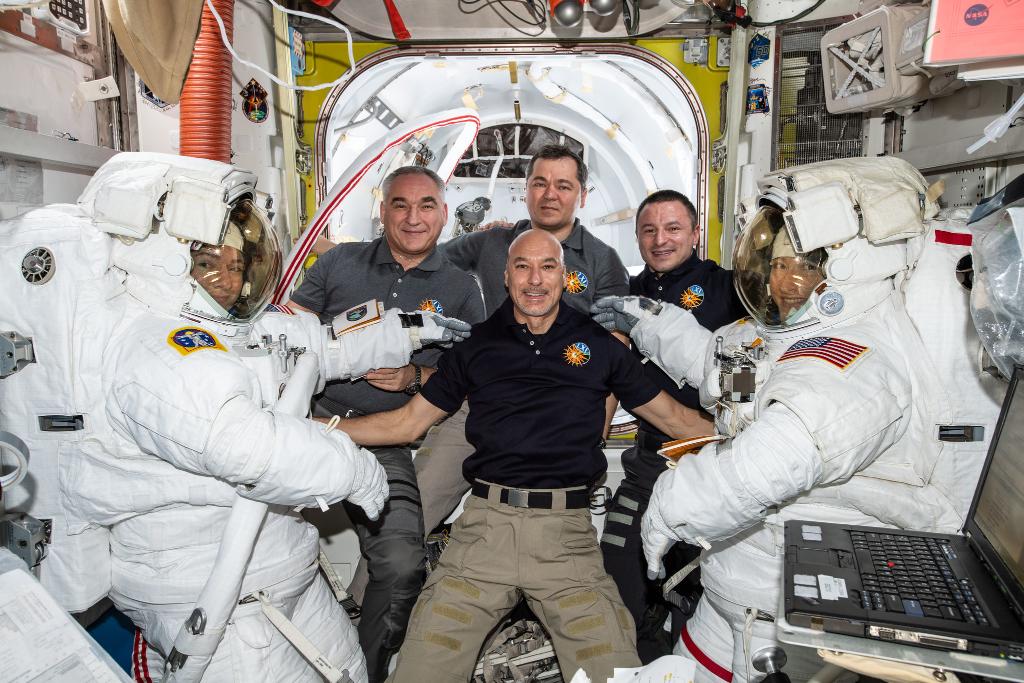2020 in Space! Astronauts Ring in New Year (and Decade) from Orbit
Happy New Year from SPACE!

The people of Earth weren't the only ones ringing in the year 2020 at midnight. Six explorers in orbit celebrated the new year's arrival - and indeed, a new decade - aboard the International Space Station.
"Happy New Year from low Earth orbit!" NASA astronaut Andrew Morgan wrote on Twitter as Earth began the year 2020.
Morgan celebrated 2020's arrival with crewmates Christina Koch and Jessica Meir (both of NASA), European Space Agency astronaut Luca Parmitano, and Russian cosmonauts Oleg Skripochka and Alexander Skvortsov. Parmitano commands the crew, known as Expedition 60.
Related: The Space Missions to Watch in 2020
More: The 10 Must-See Skywatching Events in 2020
Celebrating a new year in space is a bit different than ringing in Jan. 1 on Earth. For starters, astronauts orbit the Earth 16 times a day, meaning they see 16 sunrises and sunsets as the circle the planet every hour and a half. Then there's their time zone, which meant the station crew saw 2020's arrival before flight controllers at NASA's Mission Control center in Houston.
"The space station operates on Greenwich Mean Time, or GMT, meaning it will only be 7 pm ET when the orbiting astronauts' clock strikes midnight to ring in the new year," NASA officials said in a Twitter statement.
Happy New Year from low Earth orbit! https://t.co/zt54KcjXWKDecember 31, 2019
The year 2020 is a major milestone for the International Space Station. In November, the station will celebrate 20 years of continuous operation with a human crew. (The first station crew Expedition 1 arrived in 2000.)
Get the Space.com Newsletter
Breaking space news, the latest updates on rocket launches, skywatching events and more!
SpaceX and Boeing are expected to begin flying astronauts to the station for NASA on commercial spacecraft. SpaceX's Crew Dragon will fly an uncrewed in-flight abort test in early January as part of that work.
Meanwhile, Christina Koch is on a record-breaking mission to spend nearly a year in space (328 days to be exact) and has already set a new record for the longest single spaceflight by a woman.
This incredible photo by @Astro_Christina as my #Soyuz headed to @Space_Station in September sums up 2019 – my most extraordinary year yet. #TheJourney was certainly not only my own, I remain in debt to countless individuals on the ground. #HappyNewYear to all on (& off) #Earth! pic.twitter.com/R7oPKkogqoDecember 31, 2019
Meir celebrated the new year on Twitter with a photo of her own launch as seen by Koch in space in September. The image, Meir said, summed up 2019 as her "most extraordinary year yet."
"The journey was certainly not only my own, I remain in dept to countless individuals on the ground," Meir said. "Happy New Year to all on (& off) Earth!"
- The 100 Best Space Photos of 2019
- 10 Things That Blasted Through Space in 2019
- The Greatest Spaceflight Moments of 2019
Email Tariq Malik at tmalik@space.com or follow him @tariqjmalik. Follow us @Spacedotcom, Facebook and Instagram.

Join our Space Forums to keep talking space on the latest missions, night sky and more! And if you have a news tip, correction or comment, let us know at: community@space.com.

Tariq is the Editor-in-Chief of Space.com and joined the team in 2001, first as an intern and staff writer, and later as an editor. He covers human spaceflight, exploration and space science, as well as skywatching and entertainment. He became Space.com's Managing Editor in 2009 and Editor-in-Chief in 2019. Before joining Space.com, Tariq was a staff reporter for The Los Angeles Times covering education and city beats in La Habra, Fullerton and Huntington Beach. In October 2022, Tariq received the Harry Kolcum Award for excellence in space reporting from the National Space Club Florida Committee. He is also an Eagle Scout (yes, he has the Space Exploration merit badge) and went to Space Camp four times as a kid and a fifth time as an adult. He has journalism degrees from the University of Southern California and New York University. You can find Tariq at Space.com and as the co-host to the This Week In Space podcast with space historian Rod Pyle on the TWiT network. To see his latest project, you can follow Tariq on Twitter @tariqjmalik.
-
zclayton New Year. Not a new Decade, I expect better from Space.com. The first year was 1 CE. 2 3 4 5 6 7 8 9 10, a decade of 10 years. Unless you can show which "Decade" only has 9 years in it, the next Decade starts on 2021. I would have thought you would remember from the 1999-2000-2001 fiasco for the end of the 20th century and start of the 21st century in 2001.Reply -
mylakay Replyzclayton said:New Year. Not a new Decade, I expect better from Space.com. The first year was 1 CE. 2 3 4 5 6 7 8 9 10, a decade of 10 years. Unless you can show which "Decade" only has 9 years in it, the next Decade starts on 2021. I would have thought you would remember from the 1999-2000-2001 fiasco for the end of the 20th century and start of the 21st century in 2001.
Thank you! I am so tired of explaining when a decade/milenium begins and ends. The number of people and web sites that are wrong is enormous. There is no way to send a message to all of them, correcting their information. Kudos!
